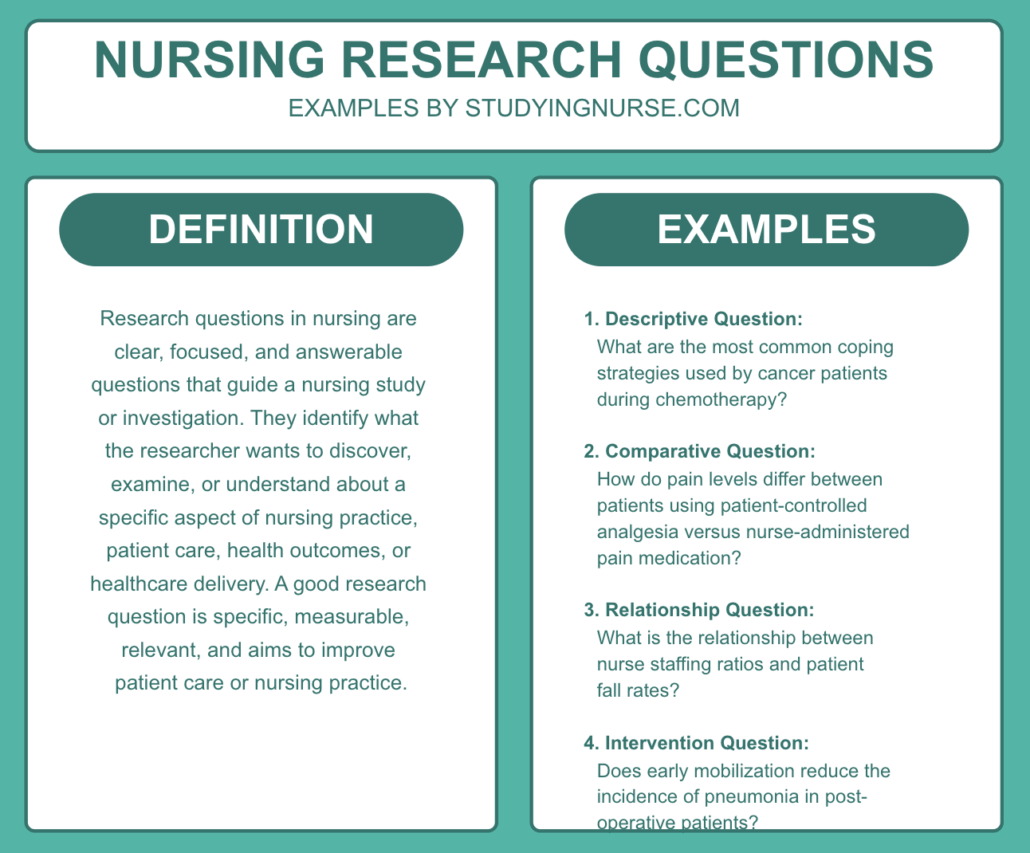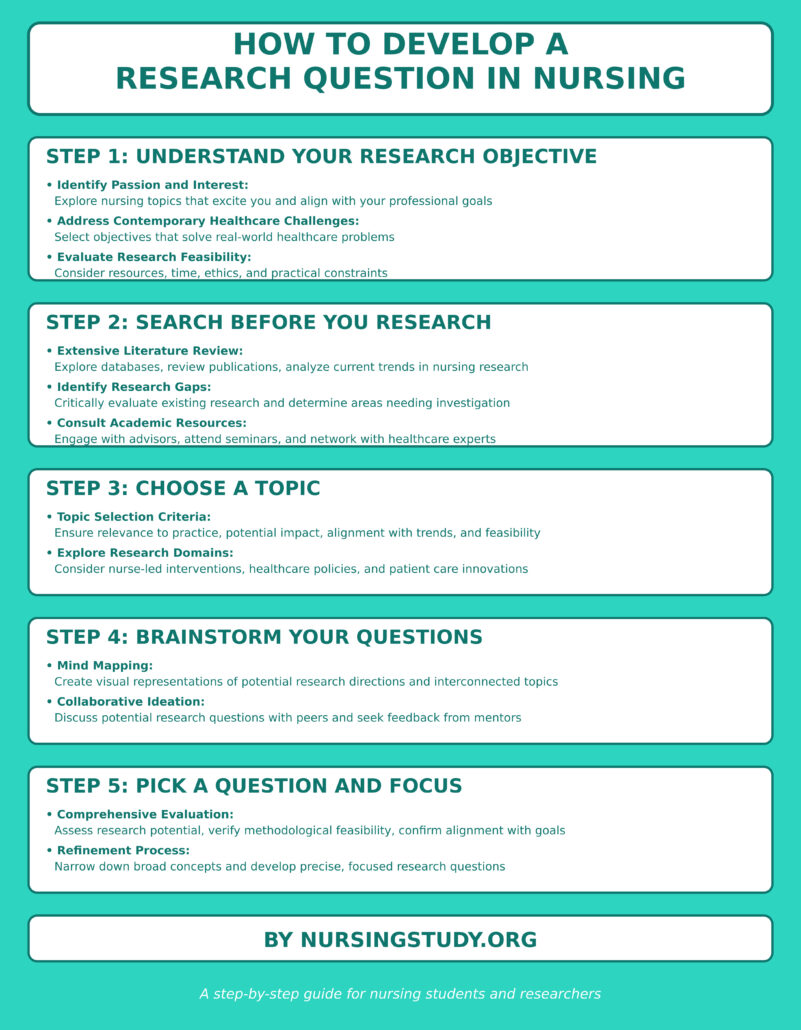Research questions in nursing are clear, focused, and answerable questions that guide a nursing study or investigation. They identify what the researcher wants to discover, examine, or understand about a specific aspect of nursing practice, patient care, health outcomes, or healthcare delivery.

A good nursing research question:
- Addresses a gap in current knowledge
- Is specific and measurable
- It is relevant to nursing practice
- Can be answered through systematic investigation
- Aims to improve patient care or nursing practice
Research questions typically focus on relationships between variables, the effectiveness of interventions, patient experiences, or factors that influence health outcomes.
Types of nursing research questions with examples
Here are the main types of nursing research questions with examples:
1. Descriptive Questions
- What are the most common coping strategies used by cancer patients during chemotherapy?
- What is the prevalence of burnout among ICU nurses in urban hospitals?
2. Comparative Questions
- How do pain levels differ between patients using patient-controlled analgesia versus nurse-administered pain medication?
- What are the differences in recovery time between laparoscopic and open surgery patients?
3. Relationship/Correlation Questions
- What is the relationship between nurse staffing ratios and patient fall rates?
- Is there a correlation between patient satisfaction scores and nurse communication skills?
4. Causality/Intervention Questions
- Does early mobilization reduce the incidence of pneumonia in post-operative patients?
- How does implementing bedside shift reporting affect patient safety outcomes?
5. Exploratory Questions
- How do families experience end-of-life care in hospice settings?
- What factors influence new graduate nurses’ decisions to leave the profession within the first year?
6. Evaluation Questions
- How effective is simulation training in improving nursing students’ clinical competency?
- To what extent does a hand hygiene education program reduce hospital-acquired infections?
7. Predictive Questions
- What factors predict readmission rates among heart failure patients?
- Can early warning scores accurately predict patient deterioration in medical-surgical units?
8. Qualitative/Phenomenological Questions
- What is the lived experience of nurses caring for COVID-19 patients during the pandemic?
- How do patients with chronic pain describe their quality of life?
9. Prevalence/Incidence Questions
- What is the incidence of catheter-associated urinary tract infections in long-term care facilities?
- How common is medication administration error among night shift nurses?
10. Cost-Effectiveness Questions
- Is telehealth monitoring more cost-effective than traditional home visits for diabetic patients?
- What is the economic impact of implementing a nurse-led wound care clinic?
11. Retrospective Questions
- What were the contributing factors to adverse events in the emergency department over the past year?
- How have discharge planning protocols evolved over the last decade?
12. Prognostic Questions
- What is the survival rate of patients with sepsis who receive early goal-directed therapy?
- What outcomes can be expected for stroke patients receiving rehabilitation within 24 hours?
15 Research Questions Examples
Here are 15 current and researchable nursing research questions for 2025:
- How does the integration of artificial intelligence in clinical decision support systems affect nursing workflow efficiency and patient outcomes?
- What is the effectiveness of virtual reality therapy in reducing anxiety and depression among hospitalized adolescents?
- What factors contribute to nurse retention in post-pandemic healthcare settings?
- How does remote patient monitoring compare to traditional in-person follow-up care in managing chronic heart failure patients?
- What are nurses’ perceptions and preparedness levels for providing care during climate-related health emergencies?
- How effective are nurse-led antimicrobial stewardship programs in reducing inappropriate antibiotic use in long-term care facilities?
- What is the relationship between food insecurity and hospital readmission rates among patients with diabetes?
- How do transgender patients experience healthcare interactions with nursing staff in emergency departments?
- What knowledge gaps exist among nurses regarding the application of pharmacogenomics in medication management?
- Does implementation of a four-day work week reduce burnout and improve job satisfaction among critical care nurses?
- What barriers do undocumented immigrants face in accessing postpartum nursing care?
- How accurate are consumer-grade wearable devices in detecting early signs of clinical deterioration in home care patients?
- What communication strategies are most effective for nurses addressing vaccine hesitancy among parents of young children?
- How does nurse-led music therapy impact agitation and quality of life in patients with advanced dementia?
- What is the effectiveness of culturally tailored prenatal education programs in reducing maternal mortality among Black and Indigenous women?
How do I formulate a research question?

What are the 6 steps in developing a research question?, Research question examples
STEP 1: Understand Your Research Objective
Developing an exceptional example of a nursing research question begins with a profound understanding of your research objective. This critical first step requires nursing students to engage in deep introspection and systematic analysis of potential research domains.
Key considerations for defining your research objective include:
- Identifying Passion and Interest- Successful research stems from genuine curiosity. Explore nursing research topics that genuinely excite you and align with your professional aspirations. Consider areas like mental health nursing, pediatric nursing, end-of-life care, or chronic disease management that resonate with your academic and professional goals.
- Addressing Contemporary Healthcare Challenges- Select research objectives that contribute to solving real-world healthcare policies and nursing practice challenges. Look for gaps in current knowledge that can be addressed through systematic investigation.
- Evaluating Research Feasibility- Assess the practicality of your potential research objective. Consider:
- Available resources
- Time constraints
- Access to research participants
- Ethical considerations
- Potential for meaningful evidence-based practice contributions
STEP 2: Search Before You Research
Comprehensive preliminary research is crucial before finalizing your research question. This stage involves:
- Extensive Literature Review
- Explore academic databases
- Review recent nursing research paper publications
- Analyze list of nursing research topics
- Identify current trends in research in nursing
- Identifying Research Gaps
- Critically evaluate existing research
- Determine areas requiring further investigation
- Look for opportunities to contribute novel insights to nursing knowledge
- Consulting Academic Resources
- Engage with academic advisors
- Attend research seminars
- Network with experienced healthcare providers
- Utilize university research repositories
STEP 3: Choose a Topic
Selecting an appropriate research topic requires strategic consideration:
- Topic Selection Criteria
- Relevance to nursing practice
- Potential for significant impact
- Alignment with current healthcare trends
- Feasibility of research
- Exploring Research Domains Consider emerging areas such as:
- Nurse-led interventions
- Healthcare policies
- Patient care innovations
- Evidence-based practice strategies
STEP 4: Brainstorm Your Questions
Effective brainstorming involves:
- Mind Mapping
- Create visual representations of potential research directions
- Explore interconnected nursing topics
- Collaborative Ideation
- Discuss potential research questions with peers
- Seek feedback from academic mentors
STEP 5: Pick a Question and Focus
Final selection requires:
- Comprehensive Evaluation
- Assess research potential
- Verify methodological feasibility
- Confirm alignment with academic goals
- Refinement Process
- Narrow down broad concepts
- Develop precise, focused research questions

PICO(T) Framework: Structured Research Question Development
The PICO(T) framework provides a structured approach to formulating research questions, particularly in quantitative nursing research.
Population (P)
- Define the specific patient group or population
- Consider demographic, clinical, and contextual characteristics
Example Populations:
- Older adults with chronic respiratory conditions
- Pediatric nursing patients undergoing surgical interventions
- Patients with complex mental health nursing needs
Intervention (I)
- Specify the precise intervention or treatment approach
- Clearly define the nursing intervention being studied
Intervention Types:
- Nurse-led educational programs
- Mindfulness-based interventions
- Specialized nursing care protocols
Comparison (C)
- Identify alternative interventions or standard care approaches
- Provide a benchmark for evaluating intervention effectiveness
Comparison Strategies:
- Standard care protocols
- Alternative treatment methods
- No intervention control groups
Outcome (O)
- Define specific, measurable outcomes
- Focus on patient-centered results
Potential Outcome Measures:
- Quality of life improvements
- Symptom management
- Patient satisfaction
- Clinical health indicators
Time (T)
- Specify the duration of the study
- Consider longitudinal research perspectives
Example PICO(T) Research Question: “Among patients with advanced cancer (P), how do nurse-administered mindfulness interventions (I), compared to standard psychological support (C) affect quality of life and pain management (O) over six months (T)?”
PEO Framework: Qualitative Research Question Development
The PEO framework offers a nuanced approach for qualitative nursing research.
Population (P)
- Detailed participant characteristics
- Contextual and demographic considerations
Exposure (E)
- Primary focus or experience being investigated
- Specific nursing interventions or care approaches
Outcome (O)
- Anticipated experiences, perceptions, or insights
- Subjective and interpretive research goals
Example PEO Research Question: “How do older adults experiencing chronic pain perceive and navigate nurse-led pain management interventions in home care settings?”
SPIDER Tool: Advanced Qualitative Research Approach
Sample
- Participant selection criteria
- Demographic and contextual considerations
Phenomenon of Interest
- Central research focus
- Specific nursing experience or intervention
Design
- Research methodology
- Qualitative approach selection
Evaluation
- Assessment criteria
- Analytical framework
Research Type
- Specific qualitative research methodology
Example SPIDER Research Question: “How do healthcare providers in pediatric nursing interpret and implement compassionate communication strategies during end-of-life care discussions?”
By mastering these frameworks, nursing students can develop robust, meaningful research questions that contribute significantly to nursing knowledge and patient care improvement.
Example of a Nursing Research Question
PICO(T) Example: Mindfulness Intervention for Chronic Pain Management
Research Question: “Among older adults with chronic lower back pain (P), how do structured mindfulness-based intervention programs (I) compared to traditional pain management techniques (C) impact pain intensity, quality of life, and medication usage (O) over a 12-week period (T)?”
Detailed Breakdown:
- Population: Adults aged 65-75 with chronic lower back pain
- Intervention: 45-minute guided mindfulness sessions twice weekly
- Comparison: Standard physical therapy and pain medication protocols
- Outcomes:
- Primary: Pain intensity reduction (measured by standardized pain scales)
- Secondary:
- Quality of life improvements
- Reduced medication dependency
- Psychological well-being assessment
- Time Frame: 12-week structured intervention with 6-month follow-up
Qualitative PEO Example: Nurse-Led Interventions in Pediatric Oncology
Research Question: “How do parents of children undergoing cancer treatment experience and perceive nurse-led supportive care interventions in pediatric oncology settings?”
Comprehensive Analysis Framework:
- Population: Parents of pediatric cancer patients (ages 3-16)
- Exposure: Comprehensive nurse-supported care model
- Outcome Exploration:
- Emotional support experiences
- Communication effectiveness
- Perceived quality of care
- Coping mechanism development
Quantitative Research Example: Healthcare Policy Impact
Research Question: “What is the effectiveness of recent healthcare policies on improving patient care outcomes in clinical nursing settings for patients with complex chronic diseases?”
Research Methodology Considerations:
- Longitudinal study design
- Multi-site hospital research
- Mixed-method approach
- Comprehensive data collection strategies
Case Study Example
Focused Research Inquiry: “What are the psychological and physiological impacts of nurse-led mindfulness interventions on patients with advanced cancer experiencing treatment-related anxiety?”
Research Components:
- Interdisciplinary research approach
- Mixed qualitative and quantitative methodologies
- Holistic patient-centered investigation
Conclusion
Developing an exceptional research question represents a transformative journey that demands intellectual rigor, methodological precision, and an unwavering commitment to advancing nursing knowledge. The path from initial curiosity to a well-crafted research inquiry is complex and challenging, requiring nursing students to navigate intricate academic and professional landscapes.
Recognizing the difficulties inherent in this process, our professional academic writing service stands as a dedicated partner for aspiring nursing researchers. We understand the unique challenges faced by nursing students in developing compelling research questions that contribute meaningfully to healthcare providers’ understanding and patient care improvement. Our team of experienced professionals brings extensive expertise in nursing research, offering comprehensive support throughout the research development journey.
FAQs
- What makes a good nursing research question? A strong research question is focused, specific, and addresses a significant gap in nursing knowledge.
- How long should a nursing research question be? Typically, an effective research question should be concise, ranging from 15-20 words.
- Can I change my research question during research? Minor refinements are acceptable, but significant changes may require reassessment of your entire research design.
- What’s the difference between quantitative and qualitative research questions? Quantitative research focuses on numerical data, while qualitative research delves into descriptive experiences.
- How do I know if my research question is original? Conduct a thorough literature review to ensure your question hasn’t been extensively explored previously.


